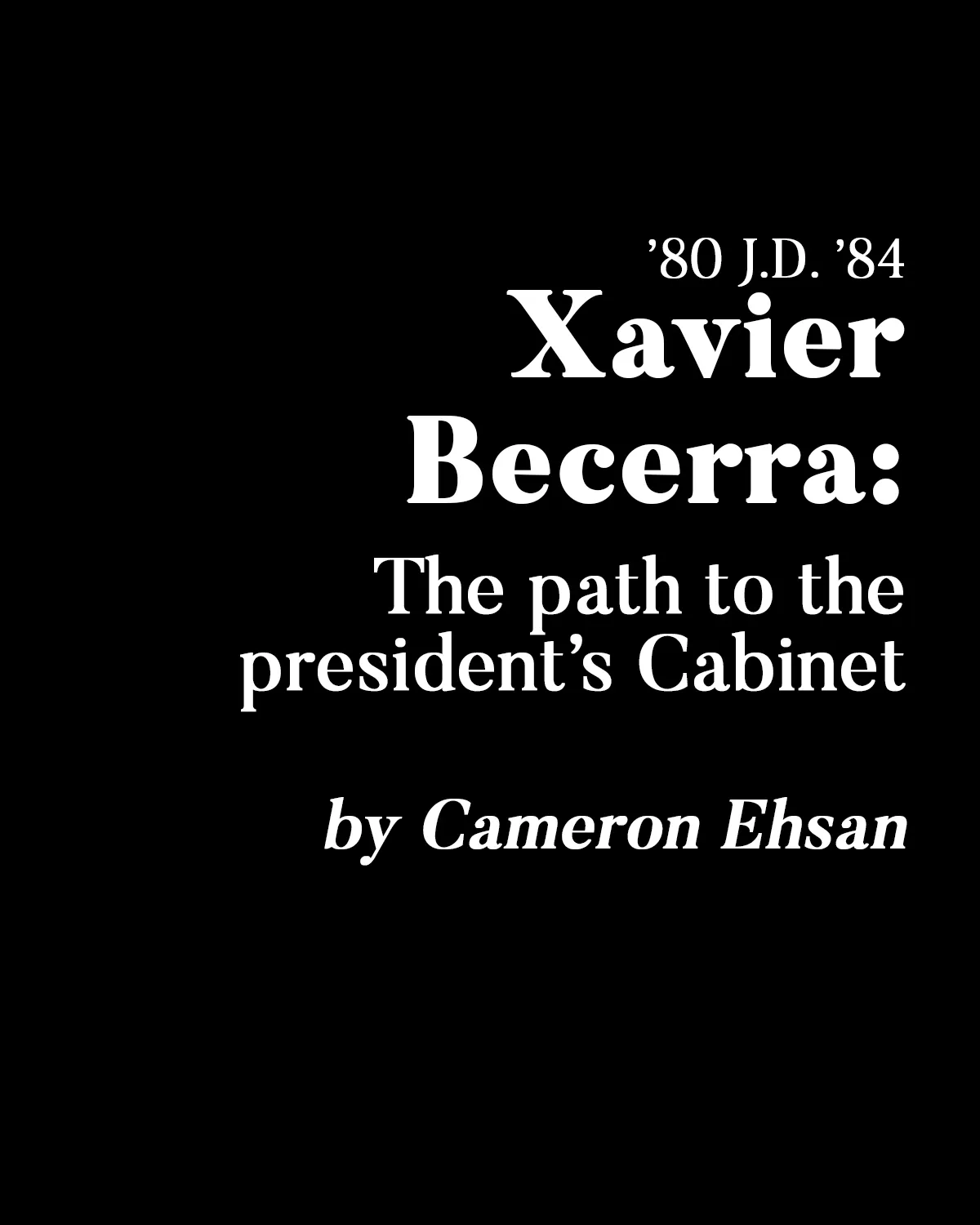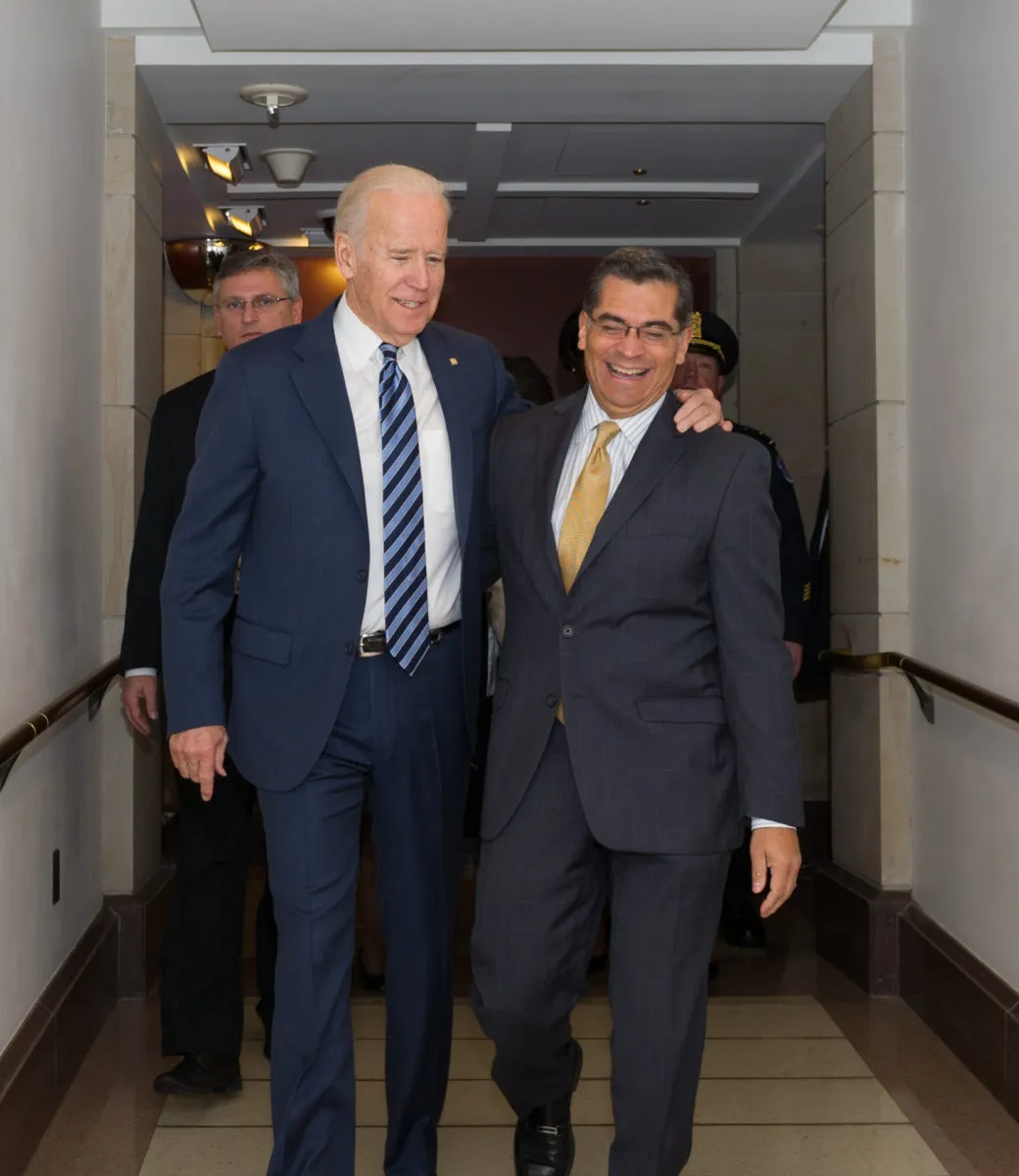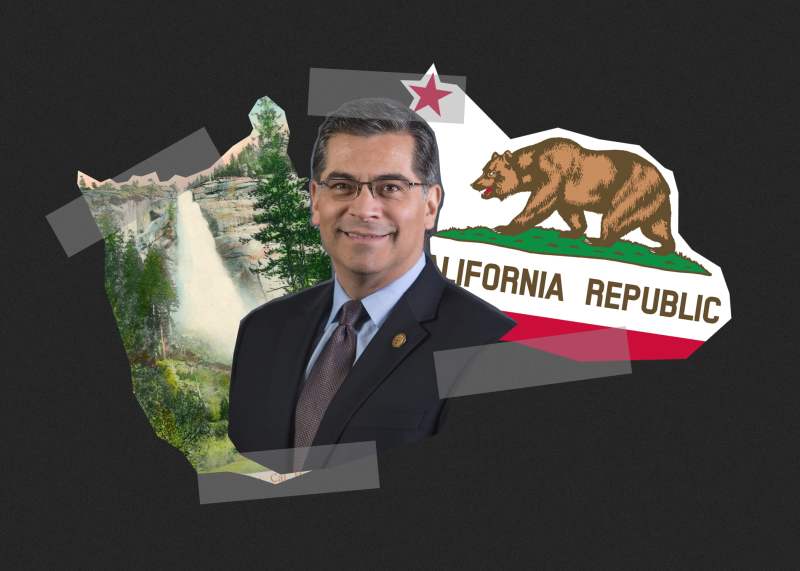

This article is part of a series of profiles of Stanford alumni in politics. Click here to read the rest of the stories.
Xavier Becerra ’80 J.D. ’84, California’s 33rd attorney general, is widely recognized as a rising star in the Democratic Party. His charisma and ability to understand and empathize with his constituents’ hardships have been key to his success over the course of his decades-long career in public service and politics. Since becoming attorney general in 2017, Becerra has proved to be the Trump administration’s top legal opponent, filing dozens of lawsuits against the federal government. And now, three decades after he was sworn into his first elected office, Becerra is poised to embark on a new mission to curb the coronavirus pandemic and safeguard health care as nominee for secretary of health and human services in President-elect Joe Biden’s administration.
Since the very beginning, advocacy has been one of Becerra’s guiding principles, inspiring him to fight for a more equitable and just society for all individuals. His advocacy can be traced back to his formative years as both an undergraduate and law school student at Stanford in the late seventies and early eighties.
Born in Sacramento, Becerra is the son of immigrants who came to the United States from Mexico in search of a better life for him and his three sisters. The first in his family to attend college, Becerra says that he did not truly grasp the experience he was embarking on by attending Stanford. Underprepared for the rigors of university academics and away from his local community for the first time, he was able to find solace in Casa Zapata. “In many ways, it was like a home, or as close to home as I could get,” he said, adding that the people he was meeting in classes and around campus were very different from the neighborhood he grew up in. “I believe Casa Zapata really did give me that fulcrum that let me survive my four years at Stanford.”
Although Becerra was an economics major as an undergraduate student, he had intended to study the sciences or engineering, a choice he described as “naive” since he had little exposure to the subjects in high school. He eventually settled on a course load that combined mathematics and the humanities.
Among his favorite courses at Stanford was Man and His Environment, taught by Gil Masters Ph.D. ’66, emeritus professor of civil and environmental engineering. The course has been adapted over the years, but it is still being offered today under the title CEE 70: “Environmental Science and Technology.” Becerra said that Man and His Environment was one of the first classes that encouraged him to adopt a global perspective about environmental issues, recognizing that environmental effects were interlinked with every other aspect of society. As attorney general, Becerra has been vocal about protecting clean air and water for Californians and ensuring a sustainable climate.
He also looked back fondly on a Chicano literature class he took as an undergraduate; growing up he said he did not have the chance to delve into the literature of Latino writers, and so taking the course afforded him a new, yet familiar perspective on the Latinx experience.

Not only did attending Stanford influence Becerra’s professional life, but it also had a significant impact on his personal life. He met his future wife, Carolina Reyes ’81, at Stanford. Reyes, who also lived in Casa Zapata, majored in human biology and attended Harvard Medical School after graduating from Stanford. Becerra said that he was always impressed by her discipline and observed just how hard Reyes had to apply herself. “We’re still together,” he said. “And we now have three daughters, two of them went to Stanford. You know, Stanford has given me a lot, including my family, and I am thankful for the experiences I had.”
At Stanford, Becerra participated in work-study to help cover his expenses, tutoring underprivileged children as a part of Barrio Assistance, a Stanford student-run literacy tutoring and mentoring program. His experience working with preschool and elementary school students in East Palo Alto opened to the inequities faced by the children. “I loved the experience, but I also learned how easy it was for these kids to fall behind in school because they were essentially drowning not knowing how to swim,” Becerra said. “And I think that really gave me a strong sense that I wanted to do advocacy work and thought of becoming an attorney.”
Becerra also recalled when his parents, who were unable to afford an attorney, asked for his help to try to recover money that they had been swindled out of when he was an undergraduate. Although he was unsuccessful in his efforts, he said, “That was another event in my life that zeroed me in on wanting to be as good an advocate as I could be, and it became more and more clear that meant becoming a lawyer.”
After graduating with a bachelor’s in economics and participating in the California Senate Fellows Program, Becerra matriculated at Stanford Law School. He characterized his three years at Stanford Law as impactful, but also a struggle to keep up with the demands of a fast-paced curriculum. “There’s a classmate who continues to be a good friend, Sandra Ortiz [’80 J.D. ’84], who is just whip-smart and who I figured if I could stay close to where she was then I wouldn’t be doing all that badly,” he said, adding that “It was always a matter of trying to keep up with folks.”
Following his graduation from law school, his desire to advocate for others led him to Massachusetts, where he worked on behalf of low-income individuals and those with mental illnesses at a legal services office for a year. When he moved back to California, he was approached by a state legislator he had met during his gap year, Democratic California State Senator Art Torres, who offered Becerra a policy position in his office. Although he originally wanted to join the California attorney general’s office, he was convinced to take the position, initially working with the state senator in Sacramento, and later being selected to head Torres’ district office in Los Angeles.
He went to Southern California intending to eventually return to the state capital to resume policy work, “but I ended up meeting a whole lot of folks in the Senator’s district and made great friends and allies,” he said. The time he spent in the Los Angeles area would prove crucial to his future political career.
After returning to Sacramento and serving as deputy attorney general for three years, a seat in the California State Assembly became vacant in a district near Torres’ constituency. “I was approached by some of the same people I had gotten to know in the senator’s district office and they asked me, ‘Xavier, have you ever thought about running for office? There’s an open assembly seat and we would love to support you if you choose to run.’” Becerra said he was taken aback because up until that moment he had not considered running for public office. With the filing period for the assembly seat quickly approaching, Becerra had to make a quick decision. He broached the subject with his wife Carolina, and the two agreed that he would run for the seat.
In 1990, Becerra launched his campaign for the California State Assembly. With little financial resources and name recognition, he went on to receive 60% of the vote and serve one term in the assembly, representing the 59th district. “There wasn’t a plan,” he said. “I wasn’t like Bill Clinton plotting my course. I’ve just been very fortunate along the way.”
(Responses have been edited for length and clarity.)
The dance where I caught my now-wife right before she was leaving the party to go to her room and was able to catch her before she left and asked if she wanted to dance. And from there, you know, the rest is history. So I’ve been very fortunate, but most of my good fortune has come as a result of having a really stable force and anchor in my life. I am very fortunate Carolina, my wife, entered my life. But for that night, who knows if we would be together.
The growing gap between those with access — whether it’s tech, knowledge or resources — and those who are getting left behind because they’re not on the same track. A clear example of that is now very evident as a result of the COVID pandemic where kids are trying to learn, and there are some families who don’t have internet access. Trying to teach your child when there’s no access to internet at home, it becomes impossible. There’s this disparity that the greatest and richest state in the country suffers: The gap between those who are connected and those who are not is growing dramatically. So it begins to make sense why California can be such a wealthy state yet have the greatest level of child poverty in the nation. And I think the more we don’t get a grip on that, the harder it will be for us to sustain this level of prosperity. We can’t continue to import talent to fill the very challenging and attractive positions you see in Silicon Valley. We should be graduating the engineers and the scientists who fill a lot of those positions, but more often than not, some of these companies resort to importing the talent. Not only do those jobs pay good money, but they open lots of doors, and there are too many Californians who are nowhere near getting a chance to go through those doors.
Keep that spark alive. I hope you’ll follow through and I hope you’ll take the steps that get you to a successful outcome. And for me, that means doing the things that would not just make you feel that you’d be a great public servant, but that make other people feel the same way about you. So not someone who just says, “Hey, would you vote for me,” but people coming to you and saying, “Hey will you run so I can vote for you.” And I think the more you do things that make you happy, the more it’s going to shine through, and the more people will want to gravitate toward you. Everyone wants to be around success. Everyone wants to be around someone who’s up, and I don’t think most people want to go vote for people who are downers, and the more you seem like someone who’s always smiling, always happy, always alert and engaged, the more I think you can convey to people that you’re someone who can not only take a community to success, but will know how to get there. So I would simply say, light that flame and never let it burn out. The more we take a path that makes us feel good about ourselves — versus forcing issues — gets you to this point of being a public servant who really will enjoy the work, as it can be frustrating.
In 1992, Becerra was elected to the U.S. House of Representatives, serving his constituents as representative for nearly 24 years. During his 12 terms, he was a leading member of the Congressional Hispanic Caucus and took part in Democratic party leadership, serving as assistant to the speaker, vice chair and later chair of the House Democratic Caucus. He was also the first Latino to serve on the powerful Ways and Means Committee.
In Congress, Becerra, informed by his own experiences, sought to advocate for immigrants by opposing measures that would limit immigration, fighting efforts to make English the official language of the United States and forming a bipartisan group of lawmakers to overhaul the nation’s immigration system. Amid discussions of privatizing Social Security, he strove to keep it public, remembering how his own parents, who had been defrauded, relied significantly on the stability of Social Security. In the Ways and Means Committee, Becerra attempted to expand welfare benefits to immigrants and increase tax credits for the working class.
Following Kamala Harris’ election to the U.S. Senate, California Governor Jerry Brown, a Democrat, offered Becerra California’s top law enforcement position. The appointment, which he at the time called “an opportunity I cannot refuse,” meant his return to his hometown, Sacramento, and undertaking leadership in the office he sought out at the start of his career. Since his appointment in 2017 and subsequent election in 2018, Becerra has become one of the Trump administration’s top legal opponents, filing over 100 lawsuits challenging the federal government’s policies on matters related to climate change, immigration, birth control and the disputed citizenship question in the 2020 U.S. Census, among others.
Becerra’s advocacy has also centered on health care and equity. In November, Becerra and more than 20 states, the House of Representatives, health care advocates and labor unions defended the Affordable Care Act before the Supreme Court. Although the Court has upheld the law twice before, the Court’s makeup and ideological balance have shifted significantly since its last ruling in 2015, potentially putting the law in jeopardy.
“The ACA has been life-changing and now through this pandemic, we can all see the value in having greater access to quality health care at affordable prices,” Becerra said in June. “Now is not the time to rip away our best tool to address very real and very deadly health disparities in our communities.” With the health insurance coverage of more than 20 million Americans enduring a pandemic resting on his shoulders, Becerra faces a crucial battle.
In April, Becerra led a group of 22 states against a Mississippi law that prevented physicians from providing abortions past 15 weeks.
“Laws like Mississippi’s are a systematic attempt to undo a woman’s constitutional rights under Roe v. Wade,” he said at the time. “I will continue to stand up for safe access to reproductive care and defend these rights for all women.”
With a shifting political landscape and new occupants of the White House come January, Becerra will find himself back in Washington, D.C. as the nation’s first Latino secretary of health and human services. As secretary, Becerra will have to grapple with the challenges posed by the coronavirus pandemic that has taken over 280,000 American lives and is disproportionately impacting people of color. In the coming months, Becerra will play a key role in managing the distribution of coronavirus vaccinations and educating Americans on the importance of mitigation efforts and inoculations.
Political science professor Jim Steyer ’78 J.D. ’83, a long-time friend of Becerra, lauded President-elect Biden’s selection, telling The Daily that “his professional experience and personal story make Xavier perfectly positioned to assume this important role at a critical moment in our nation’s history.”
“I could not be prouder of Xavier’s leadership, and he truly deserves this great honor and will do all of us proud,” Steyer added.
Whatever cards lie in his future, one thing is clear: Becerra has emerged as a fearless advocate who views the world through the lens of his own lived experiences. Safeguarding the fundamental right to health care, striving to preserve our environment for ourselves and posterity, protecting immigrants and fighting systemic racism — Attorney General Becerra has stayed true to the individual he dedicated himself to be over 40 years ago at Stanford.
Contact Cameron Ehsan at cehsan ‘at’ stanford.edu.
